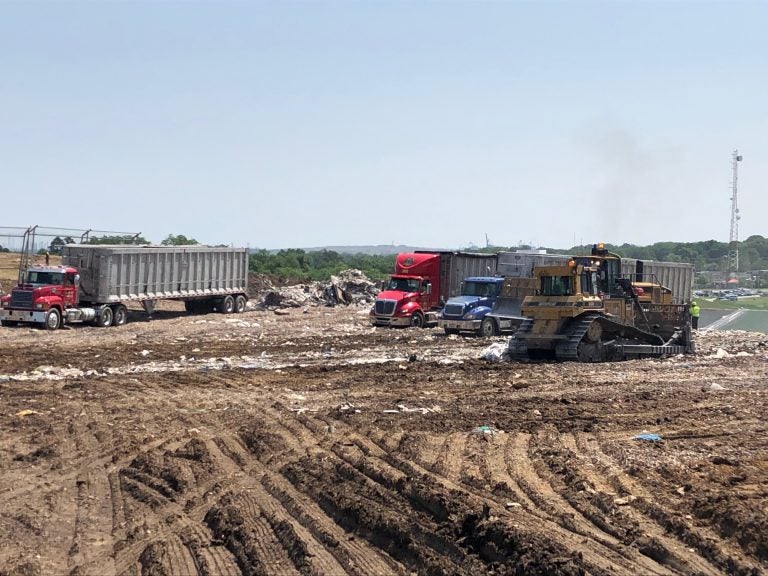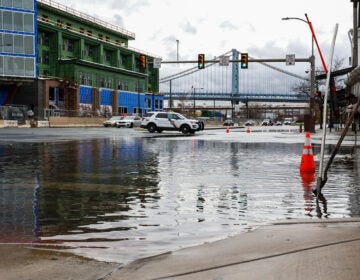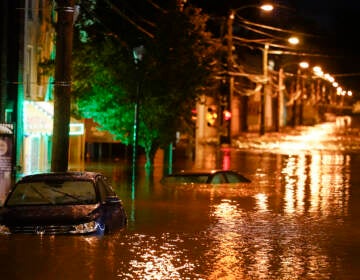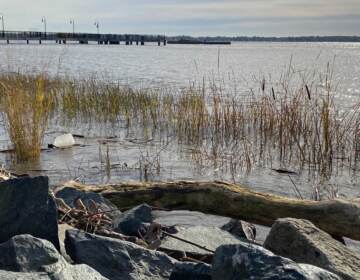University of Delaware researching how methane leaks from landfills
University of Delaware is one of five institutions across the U.S. that received funding from the EPA to study how to measure methane in landfills more accurately.

File photo: A landfill just south of Wilmington, Del. (Cris Barrish/WHYY)
This story is part of the WHYY News Climate Desk, bringing you news and solutions for our changing region.
From the Poconos to the Jersey Shore to the mouth of the Delaware Bay, what do you want to know about climate change? What would you like us to cover? Get in touch.
University of Delaware scientists are using a $1 million federal grant to determine how to measure methane in landfills more accurately.
The institution is one of five across the U.S. that received funding from the Environmental Protection Agency.
As residential, commercial, and industrial waste degrades in municipal landfills, it generates gas. Half of these gas emissions are methane, which contributes to climate change, according to the EPA.
“Methane is a potent climate pollutant, which is why improving our understanding of the impacts of methane and other pollution from landfills is crucial to our efforts to address climate change,” said Chris Frey, assistant administrator for EPA’s Office of Research and Development, in a statement.
“EPA is investing in landfill emissions research to improve the scientific foundation for decisions to protect people and the planet. Results from this research will have a global impact on informing approaches to reduce methane emissions and more sustainably manage landfills.”
The greenhouse gas traps more heat in the atmosphere than carbon dioxide, so scientists say reducing methane emissions could help limit global warming.
It’s estimated landfills account for about 15% of methane produced by humans, said researcher Paul Imhoff, a civil and environmental engineering professor at the University of Delaware.
“We want to do what we can, especially the low-hanging fruit, for reducing greenhouse gas emissions that might not be too costly, but also can allow us to do some effective things in terms of improving the risk associated with climate change,” he said.
Scientists are concerned methane measurements in landfills are not completely accurate, because weather patterns can change when and how much methane leaks.
So the University of Delaware researchers will study how atmospheric conditions affect methane leaks and determine the best technologies to measure emissions more accurately.
The EPA said the projects will help advance methods for monitoring landfill emissions, evaluate strategies for reducing these emissions, and improve understanding of how municipal solid waste landfill emissions may change due to future climatic conditions, including extreme weather.
Those findings will eventually help landfill managers use control measures more effectively, Imhoff said. That could mean adjusting gas collection systems to prepare for the conditions that contribute to significant methane leaks.
“The goal [of the research] is to get better estimates for how landfill [methane] emissions are occurring, how they’re affected by different conditions in the landfill, and with that knowledge, [how] to mitigate the emissions,” Imhoff said.
The university is collaborating with companies that are independently developing new drone and satellite technologies that measure methane emissions. The researchers will evaluate the accuracy of those technologies, which are being tested on landfill sites in California and Georgia. The researchers also are partnering with landfill managers who are interested in improving their practices to prevent emissions.
“Engineering firms and landfill owners do a lot in terms of trying to collect any methane that’s generated and use it for energy, so there’s the opportunity, if there are emissions, to potentially make some management changes that could have a big effect,” Imhoff said.
Methane in landfills is largely caused by biodegradable materials, such as food waste, leaves, and grass.
“All of us are having an impact on the environment through some of our lifestyle practices,” Imhoff said. “We consume things, and what we discard has to be disposed of in some way. And unfortunately, that has an environmental impact.”

Get daily updates from WHYY News!
WHYY is your source for fact-based, in-depth journalism and information. As a nonprofit organization, we rely on financial support from readers like you. Please give today.







